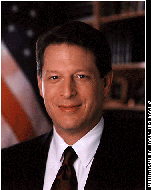Gore Tells an Inconvenient Truth
 Keywords: Al Gore; An Inconvenient Truth; glaciers melting; Thank You for Smoking; global warming; emotions; oil interests.
Keywords: Al Gore; An Inconvenient Truth; glaciers melting; Thank You for Smoking; global warming; emotions; oil interests.Today I saw Al Gore’s An Inconvenient Truth – a movie about his marvelous traveling slide show on global warming. He’s given this show more than 1,000 times over the years, and I think everyone in the world needs to see it.
The problem is, knowing is one thing, while acting on that knowledge is quite another. About half his presentation deals with the factual information – with photos of melting ice fields that ought to shock anyone who watches it – but the other half deals with the psychological obstacles to having people absorb the information and get involved in solving the problem.
The intermediate link in this logic consists of his observation that the problem is solvable. I’m not actually sure that it truly is solvable, but Gore is pretty persuasive in suggesting that it is, and for that I can only rejoice. Of course, even if catastrophe is now unavoidable, we need to do everything possible to minimize or reverse the impending doom. What has been happening so far is hardly anything – at least in comparison to what is required.
But Gore is personally so appealing here that he’s covering the motivational angle too. Motivation and knowledge are psychologically different processes, though of course both are required. The motivation is linked to our system of values, preferences, emotions, and personal attachments. Unless someone presents information in a way that touches my sentiments, it will simply be a declarative statement that doesn’t mobilize us to get up and do anything about it. But the man is truly admirable and likeable, at least in this film. I wish those qualities had shone through more apparently during his political campaigning. I could imagine developing deep affection for him – which would be enough to get me motivated to help him. There will be others, of course, who approach this film with great resistance, and nobody can win over all those people. He even expresses a tolerant patience for such people, saying that it’s only human to need some time to make a drastic reversal of opinion and action.
Yet it’s more than simple psychological sluggishness involved here. The denial of this message is orchestrated politically, apparently under the direction, to some extent, of economic interest groups. Gore makes the comparison between the awareness of the deleterious effects of tobacco and of global warming. His family had raised tobacco, but then his sister died of lung cancer and his father stopped farming tobacco. That emotional event punctured the denial that had allowed them to continue in their customary way. His motivation was affected emotionally by her death and by the nearly fatal injury of his own son. Emotions are required to galvanize everyone.
Now he is tactful in addressing his political enemies, but it is clear that those enemies are economic blocs – especially big oil – and that they are linked politically to George W. Bush himself. If ever there was a disastrous political mistake made by a democracy, it has to have been Bush’s defeat of Gore under the direction of the US Supreme Court. If the court had not stopped the recount of the votes, the course of history would have been extraordinarily different. Gore does not go into the questions about electoral fraud, but simply notes that this outcome was a hard blow but he had made the best of it.
What do we do about people who are in denial? I suppose his good-natured patience is the best approach, but it would be wrong just to let others continue unchallenged. The denial is managed; it’s not just a matter of individual heads-in-the sand. Gore’s opponents call global warming a “theory,” as a matter of policy. The cynical manipulation of public opinion for financial gain can be matched only by the recent fictional movie, “Thank You for Smoking.”
Over 900 scientific papers on global warming were examined. Of them, not one questioned the factual nature of the warming trend. Yet of more than 600 articles in the popular press, 53 percent discounted it as a mere hypothesis or “theory.” This discrediting of scientific research is morally wrong, and Gore is doing exactly what needs to be done in naming it as immoral.



2 Comments:
I disagree with Tednichols' view. Global Warming is a real issue, much of it created by 'Man'. These are our footprints. There is much credible scientific evidence to support this.
Professor Spencer, thanks for your wonderful post. I will go and see Al Gore's movie when it comes to my area of Brampton.
BTW, I just received the info about your CBC interview tomorrow evening (Wed. June 7) on their Ideas programme, from 9-10 pm, from our mutual acquaintance Bill Bhaneja in Ottawa. I posted a little about it, and also put in and introduction about you (which I took from your site) on my blog here: (hope you don't mind)
http://verbena-19.blogspot.com/2006/06/cbc-radio-ideas-of-metta-spencer.html
I'm glad to see such a lively discussion here. Thanks for contributing. But I have to urge Ted to see the film. I really don't think you could discount his argument if you were to see the whole thing.
Also I should say that I expect to go on a trip in a week to promote my book. I will be gone a month, and I may miss posting sometimes. In fact, I have missed quite a lot lately anyhow. This is the only one I wrote this week.
Post a Comment
<< Home